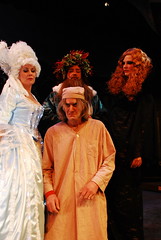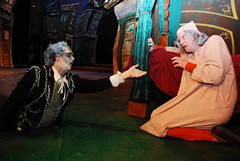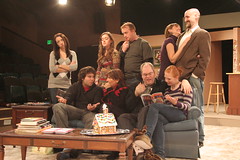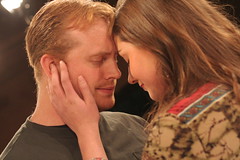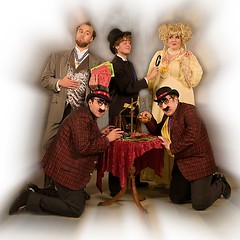
Interplayers is alive again -- the nearly full house, Joan Welch herself up there in the top row, the lively opening scene of Reed McColm's old/new Christmas play, the Spokane-obligatory but still nice-to-see standing ovation ... it felt like the turning of a corner, a rejuvenation.
It remains to be seen if playgoers will similarly turn out in droves for, say, the bleakness of Beckett when it's still gray and slushy (*Godot* in March at this same theater), but for one night at least, it felt like the Interplayers of old: a solid comedy, buzz in the lobby, people enjoying themselves.
Casual playgoers like their festive comedies for the holidays, and McColm delivers with *Together Again for the First Time*: a blended family that doesn't really get along, a bunch of wise-crackers who are hiding problems like bossiness and disappointment in love, being controlling and being in denial.
Two actors middle-aged, seven in their late teens or 20s: This show has done well in schools, as McColm acknowledges, because it has lots of age-appropriate roles for the college crowd. Better yet, it should appeal to twenty-something playgoers, because this isn't syrupy-sweet Christmas fare mired in long-ago nostalgic cultural assumptions of their grandparents. (*Star Wars* had only been out for nine years when McColm wrote this play, and it's used as Meaningful Analogy by the outsider-psychologist character [Damon Abdallah, likable and self-assertive]. The two brothers in the play treat *Star Trek* as almost current, but the mind-meld wrestling was amusing and not too dated.)
McColm knows his tricks: referring to outside events and characters in order to make a unit-set show feel as if it's part of a larger world; characters ignored by a swirl of characters, acting out their own little dramas and crying out for attention; episodes punctuated by out-of-left-field stingers from over there by the Christmas tree; throwaway jokes and gestures that round out characterizations without being underscored heavily (look at this! significant action over here!).
Bobo's away from his copy of the script just now, but despite having read and reread it and seen the movie (and now this first-ever professional production), he wants to go back over it, pore over the lines, recapture the zingers that brought delighted chuckles.
It was inevitable that, for a cast of nine that's heavy on the young'uns, a few would be making their professional stage debuts. But despite some missteps and mis-timings (oddly under-emphasized lines, slight bobbles with delivery or the logistics of props), this is a strong ensemble.
Karen Kalensky, fine as the Martha Stewart wanna-be, was convincing in all her domestic fussiness. But where she really shone was in confrontations with her sons: hitting them on the shoulder and calling them "lumps," blaming them for their flaws in ways that made it plain for all to see that actually, she was still venting her anger at the man she'd divorced eight (or more) years ago.
McColm himself, as the addled patriarch, nicely blends an Archie Bunker mentality with an ability to forbid further conversation when feelings are getting hurt too much: He's both obtuse and kindly, and it's an interesting combination to watch.
But the play, more than the movie, focuses on Roger -- the older of the matriarch's two sons, too much like his irresponsible father -- and Thomas Stewart pulls off the resentment and the compassion, the wise-ass self-loathing. Stewart took command of the stage as the architect (and other roles) in the season-opening *Dining Room." Stewart bites off hurtful one-liners, joshes around like a little boy, vents his anger, opens up his own wounds, and somehow also ends up making the play's most compassionate gesture. With humor and pain, he hits all the notes of a complex role.
All the other "kids" have their moments, and one virtue of McColm's script is that it achieves character revelation without resorting often to the predictable technique of the isolated, self-revealing monologue.
The movie has different scenes (bickering at Christmas dinner, the taping of a TV special that disintegrates because of smoldering family tensions) and less chaos (there are more two-shots and three-shots in the DVD, more F2F confrontations). McColm says that he deliberately upended his college professor's advice to write a comedy that starts slowly and has a chaotic final scene -- he and director Jack Bannon deserve much credit for an opening 20 minutes that builds and cross-cuts in dizzying ways, so well that it'd be well worth a second visit just to catch all the nuances.
At intermission, Dannie, Wife of Bobo (woman of long-suffering), made the often-heard comment that McColm's characters "act just like my family."
Bobo muttered something about how the play's universal like that -- a lot of people see their own family in this show.
To which, Kylie, Daughter of Bobo (wise at age 12), rejoined:
"I didn't think that many people knew our family."
Which is a nice compliment for McColm and the Interplayers cast to receive. *Together Again* shows us facets of ourselves - the pettiness and gratutious vengefulness, but also the cleverness and capacity to forgive and regenerate. It's a pleasant, fun, well-acted, sobering, crack-you-up kind of Christmas comedy. And it doesn't hurt that one of our own wrote it and tussled with it for about as long as many of the cast members have been alive, and that it has graduated to Lifetime and is serving in the meantime as a nice diversion in Spokane's downtown living room.
You have until Dec. 6 to see it. Afterwards, you'll be surprised at how well Reed McColm knows your family.
[photo: Reed McColm, at BooksInMotion.com]
Labels: Jack Bannon, Joan Welch, Karen Kalensky, Reed McColm, Spokane Interplayers Ensemble, Thomas Stewart, Together Again for the First Time





